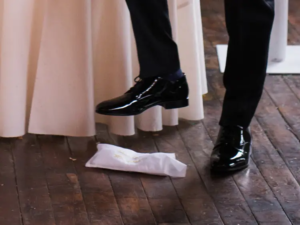The Perfect Wedding Gift
I believe that there is indeed a perfect wedding gift for a Jewish couple. It doesn’t come from Tiffany’s, nor does it sparkle in a display case. This gift has the profound power to transform your life: a mezuzah made from broken shards of glass from the wedding ceremony.
Weddings are profound liminal moments. They represent a transition from individual identity to a shared existence, brimming with potential and deep significance. As the ceremony culminates in the breaking of the glass, the tradition serves as a poignant reminder of life’s fragility. This act is not meant to overshadow the joy of the occasion. Rather it deepens our appreciation of liminal and transformative moments.
Imagine capturing the essence of the wedding ceremony—the joy, the promise, the potential—grinding it into fragments, and then preserving those fragments as part of the mezuzah at the entrance to your home. The mezuzah greets you as you arrive and cautions you as you leave. This mezuzah becomes a symbol of the joy found in loving relationships. It is also a reminder of how relationships can fragment if we stray from what truly matters.
In Parshat Re’eh, Moses prepares the Israelites for their transition from desert wanderers to settlers of the promised land. “When your God יהוה brings you into the land that you are about to enter and possess, you shall pronounce the blessing at Mount Gerizim and the curse at Mount Ebal” (Deuteronomy 11:29). These mountains symbolize the mezuzot at the doorway of Canaan, marking the transition from displacement to settled life, with reminders of both fulfillment and consequence.
The experience at Mount Sinai was like a wedding between God and the Israelites, with the Ten Commandments as the ketubah and the mountain as the chuppah. Throughout their journey, the people tested their relationship with God—just as couples do in marriage. Despite arguments and rebellions, their shared goal remained: to settle in the land promised by God.
The bond between God and Israel has historically been strongest during periods of displacement. When Jews were oppressed, they were more tightly connected to their faith. In times of security and comfort, however, this bond often falters, lured by other values and distractions. In America, a mezuzah on our doorposts serves as a constant reminder of our values. As we navigate our daily lives, it helps us stay grounded and reconnect with our spiritual heritage.
The mystical significance of a mezuzah made from broken glass is profound. Isaac Luria, a sixteenth-century Jewish mystic, taught that God initially created vessels to contain Divine Light, but these vessels shattered because they could not hold the divine essence. The sparks of Light scattered in the shards formed the world as we know it. Humanity’s mission is to gather these scattered sparks and repair the broken world.
Creating a mezuzah from the broken shards from the glass-breaking ceremony at a wedding echoes this idea. It reminds us that even when life feels shattered, we have the potential to gather the pieces and make repairs. As Psalm 30:6 says, “Weeping may endure for a night, but joy comes in the morning.” We need this reminder as we step out into the world and when we return home. The broken glass at a wedding symbolizes not destruction but the possibility of renewal and repair.
A mezuzah crafted from these broken shards embodies this powerful message. It transforms destruction into beauty and serves as a constant reminder that, even in imperfection, there is potential for repair and renewal. This is why a mezuzah made from the broken glass of a wedding is truly a perfect wedding gift.
Rabbi Evan J. Krame






 Evan J. Krame was ordained as a rabbi by the
Evan J. Krame was ordained as a rabbi by the